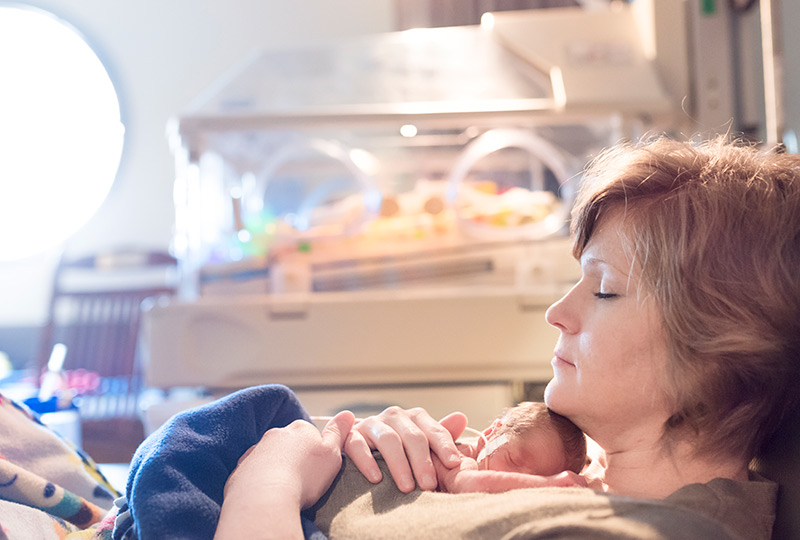The NICU has skilled staff and so much technology — but the baby has Mom and Dad.
I once met a wonderful mom and dad whose baby girl was brought in by emergency transport ambulance to our Children’s Hospital from a small community hospital in Kentucky. When I greeted them and asked what I might do for them, they wanted me to share how impressed they had been with the entire team that came into the room on morning rounds.
I thanked them, of course, but I also let them know that their role as parents is even more important.
Nurses work different shifts and our NICU doctors change every two weeks. Mom and dad are the constant. They will learn baby’s cry much sooner than any of us will. They will know his or her cues before we will pick up on them. We may be able to tell them the latest lab values and what an X-ray shows, but they will truly know their son or daughter.
Recognizing and supporting the invaluable role of parents when a baby is in neonatal intensive care is a fairly recent phenomenon.
Since the early 1960s, dramatic improvement in the care of preterm and term infants has taken place in neonatal intensive care units across our country. Knowledge has advanced along with the technical equipment to care for these babies: incubators to help babies stay warm, oxygen delivery to help with respiratory distress, supplemental forms of intravenous nutrition to nourish them.
It wasn’t until the 1970s that the role of the parent started to become an important topic. Before this time, in most hospitals and nurseries, fathers were still considered “visitors” and maternal-infant bonding was often not the priority. Strict visitation hours and policies were the norm and a sterile “do not touch” culture was routine. In the late 1980s, “family-centered care” expanded, along with visitation policies and support groups.
Thank goodness we can now introduce families to a NICU that is truly family-centered.
In our NICU at Monroe Carell Jr. Children’s Hospital, about 1,600 babies are admitted each year. Some are admitted directly from the delivery room; some are expected admissions because of a prenatal diagnosis. Others surprise parents and the delivery team; the baby is in distress and is rushed to the NICU. Other babies arrive via our neonatal transport team dispatched to hospitals in southern Kentucky, northern Alabama, all over Middle Tennessee and beyond. Some are very premature, born as early as 17 weeks too soon, while others are born right on time but with complications.
We now can choose from many types of ventilators to assist breathing, and complex formulas of IV nutrition. Our toolkit includes ultrasounds, EKGs, EEGs, MRIs, CTs, LPs, and on and on.
But with all the technology and all the latest and best equipment, there is one thing that we cannot do: We can never be Mom and Dad.
Only you can do that work.
Only you can hold their tiny hands in yours and dream of what their future holds.
Only you can imagine the enormous pride and emotional wave of excitement when you prepare to take baby home.
Only you can feel the sense of gratitude that providing breastmilk to your newborn brings you.
If your child is in the NICU, it is very important to us that you understand your importance to our team. When your baby’s condition has improved and discharge to home is near, we want you to be comfortable with the basics as well as any complex needs baby may have.
This post was written by Marlee Crankshaw, who has worked in nursing for 35 years at Vanderbilt. She currently serves as the Administrative Director for Neonatal Services for the Monroe Carell Jr. Children’s Hospital at Vanderbilt, which includes both Newborn Nursery and the Neonatal Intensive Care Unit. She is the mother of four, grandmother to 13 and great-grandmother to three.
Related reading
Parents share lessons learned in the NICU
How to support a family with a baby in the NICU


